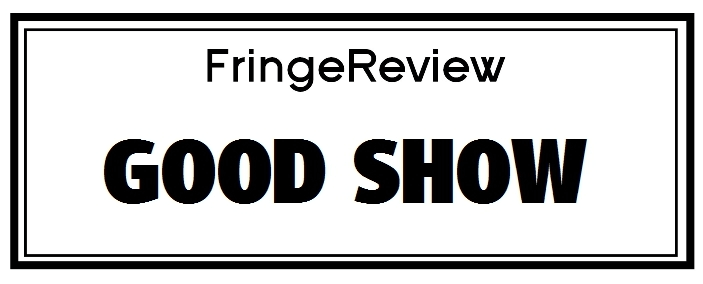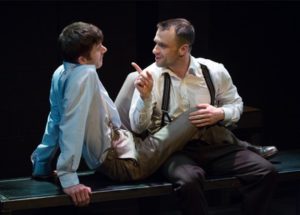FringeReview Ireland 2019

All I See Is You
Directed by Ben Occhipinti, written by Kathrine Smith

Genre: Drama, Historical
Venue: Players Theatre at Trinity College
Festival: FringeReview Ireland
Low Down
1967 UK, two young queer men navigate their connection, their relationship with their families and the law. In a world of teenage insecurity and societal oppression, what is the fate of our lovers caught in the crosshairs? Amidst laughter and tragedy is the simple need to survive this hostile environment while retaining a sense of self, community and even love.
Review

All I See Is You is an accessible, well-crafted piece of work that occasionally reads more like the cliff notes of an event than an actual moment in history. The plot centres on Bobby and Ralph, two queer men living 50 years ago in the UK. Being queer is illegal and there is a tension and taboo to all of their interactions. Their first encounter may appear somewhat recognizable to a modern audience – two kids fooling around – but in 1967 this was a quiet act of rebellion. When Ralph’s father walks in on the two boys “doing it,” there is more than humiliation on the boys’ faces, it’s out-right fear.
Excellent direction hides plot holes adding clarity to scene changes in humorous ways such as Bobby dancing his way into a queer-friendly pub while Ralph looks on stiffly. Upon an awkward second interaction, the boys’ differences emerge. Bobby is working class, he works at a record store and is as open about his sexuality as society permits. Ralph is trying to climb the social ladder. Bobby describes him as “posh” but Ralph later admits that he is the first to go to college in his family. He desires to become an English teacher to children – a position that would never knowingly employ a queer man during this time period. So Bobby is open and Ralph is closed. Bobby wears his queer identity to the fullest and Ralph suffers in hiding. But these fears are not an empty threat and what is foreshadowed may soon be realized.
The play’s writing is well structured and leaves room for little moments between the actors. Unfortunately, neither in acting nor writing is the connection of the two men cemented. This is no Romeo and Juliet. While the script often reassures that there is a strong genuine connection there is little to back up this claim. Bobby likes that he made Ralph laugh; Ralph likes Bobby’s eyes and that’s about it. Your little cousin could probably describe love or at least lust with more clarity. The two actors do well to represent distinctive and highly charismatic character. However, their first sexual encounter with each other lacks any genuine sexual chemistry. It didn’t feel like the awkward yet hopeful fumbling of two people finding each other in a country that has turned against them – it felt like two people unconvincingly pretending to be attracted to each other.
At this point, it must be addressed that both characters on stage from all descriptions, are 16-25 in age. Inexplicably, both actors appear to be significantly older. This setup suggests that there will be a significant time lapse in the show and by the end, the characters will be older which would justify the casting choice. In reality, the play takes place over no more than a few years. The actor’s age does not help support the vulnerability, the teenage romance, the naivete or hope that these young men must have felt.
There are many asides in the show – a device where an actor will talk directly to the audience. This technique is used and abused, showering us with an overabundance of insight into subconscious thoughts of the characters. Reading less like a diary page and more like a subreddit – it takes us out of the moment without providing enough meaningful information to justify its placement. One simply wants to shake the playwright and say “please show us the action instead of constantly informing us of a character’s intentions – show not tell!” This overuse of asides contributes to the lack of authenticity in the show and more so the inability to fully empathize with the characters.
Finally, returning to the cliff notes comment, the entire show lacks specificity. It reads like a set of sequential well-structured events that never fully considers the entirety of its characters either in their personality or relationship with each other. This lack of nuance once more undercuts the rawness, tension and sorrow that emerges from these times.
While lacking in specificity, the play is well crafted, entertaining and quite funny. The actor’s dialogue flows and they are both full of energy that helps drive the show – there is never a dull moment. The physical interactions and overall staging are masterful and do much to buoy our spirits. Does it say anything profound? No. But the piece is a fun and fulfilling Thursday night – a nice way to remember and reflect on a dark history.


















































